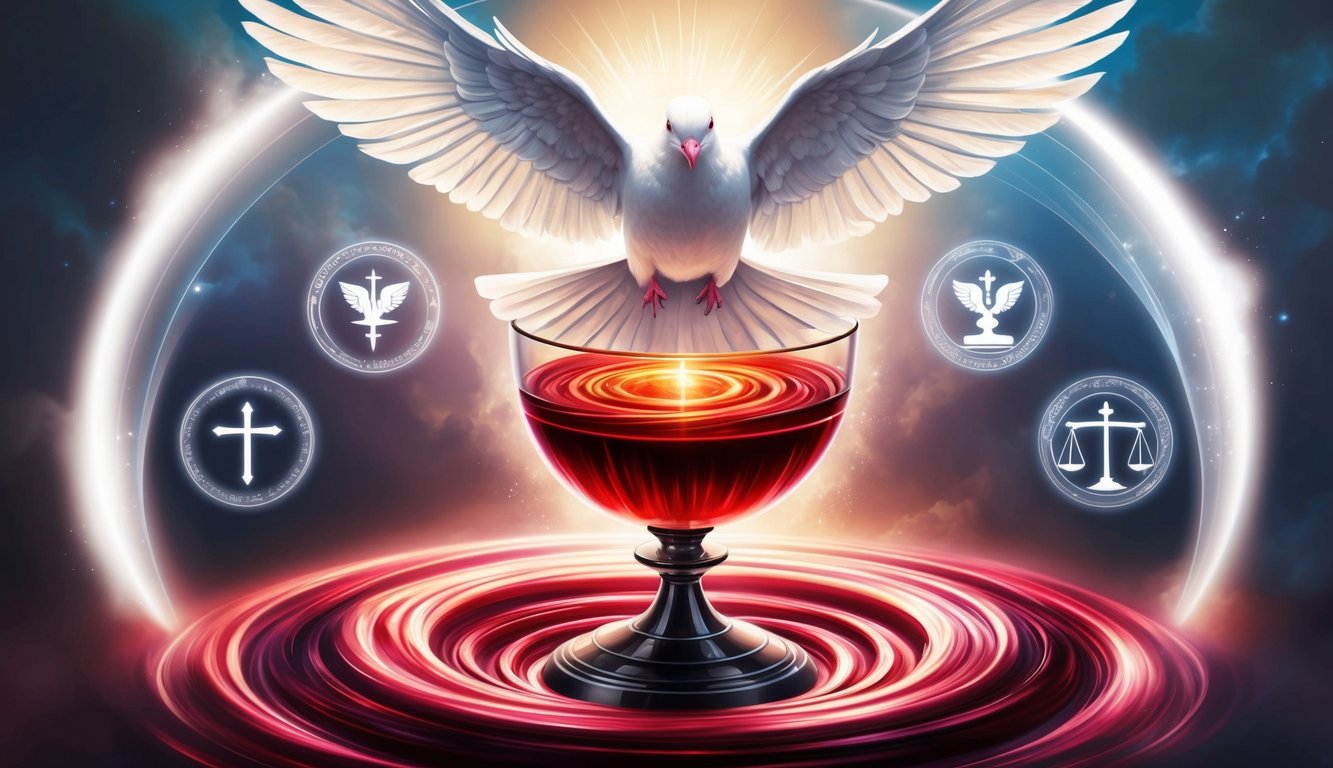Don’t Miss Out On This Unique Astrological Opportunity
Are you tired of spinning your wheels and getting nowhere? Simply put, you’re out of sync: you’re out of alignment with your astral configuration.
But: there’s a kind of map that can help you reclaim your alignment. Think of it as your own personal blueprint to success and happiness: a blueprint that will help you live your most amazing life.
Get started here.
Exploring the theme of the blood of Jesus in the Bible reveals deep insights into its significance for believers.
You might wonder why the blood of Jesus is so often highlighted in scriptures.
The blood of Jesus is considered a symbol of sacrifice and redemption that cleanses and saves, offering a fresh start to those who believe.
This topic resonates throughout biblical texts, inspiring countless sermons and teachings.
In the Gospel of John, Jesus speaks about drinking his blood as part of true belief, a metaphor for accepting his sacrifice and teachings.
This can be a bit challenging to understand at first, but it underscores the depth of commitment and connection believers are encouraged to have.
Passages like these invite you to reflect on the transformative power attributed to this spiritual element.
Additionally, many biblical scholars and texts, such as those discussed in publications like Blood and Water: Solving the Mystery of how Jesus Died by Scripture and Medical Science, delve into the historical and theological aspects of Jesus’s death, providing a rich backdrop to these teachings.
The Significance of the Blood of Jesus
The blood of Jesus holds profound importance in Christian belief, symbolizing sacrifice, covenant, and purification.
It is linked to ancient prophecies and rituals that highlight its spiritual significance.
The Old Testament Prophecies
In the Old Testament, prophets spoke of the coming Messiah and His sacrifice.
This sacrifice was to atone for sin, fulfilling the law set out by God.
The books of Isaiah and Zechariah provide insights into how Christ’s death would bring salvation.
This prophetic view ties the historical practice of sacrifice to the future promise of forgiveness.
Recognition of these prophecies deepens the connection between Old and New Testament teachings.
They served as a foundation for understanding the blood of Jesus as essential for redemption and the fulfillment of God’s promise to the ancestors.
Symbolism of the Lamb
The symbol of the lamb is central to understanding the blood of Jesus.
In biblical times, lambs were sacrificed as atonement for sin, a practice deeply rooted in Mosaic law.
This practice foretold the coming of Christ, referred to as the “Lamb of God.” He paid the ultimate price with His life to cleanse humanity of sin.
The parallel between sacrificial lambs and Jesus highlights the transformative power of His blood.
By accepting this, believers see that Jesus’ sacrifice represents perfect and eternal atonement necessary for spiritual renewal.
Covenants and the Blood
Covenants in the Bible often involved the ritual use of blood.
In the story of Moses, the blood of the covenant was pivotal in binding the Israelites to God.
Jesus’ sacrifice marked the new covenant, fulfilling and expanding upon the old.
His blood represents a new promise of grace and eternal life.
This covenant removes the barriers imposed by sin and offers a path to salvation.
By understanding the role of the blood in these covenants, you get a clearer picture of the continuity and evolution of God’s promises through different generations, with Jesus at the center.
Purification and Sanctification
The concept of purification plays a significant role in how the blood of Jesus works within Christian theology.
Unlike the temporary cleansing from earlier sacrifices, Jesus’ blood offers lasting sanctification.
It’s involved in washing away sin and making believers righteous before God.
This cleansing process is seen as necessary for entering into a holy relationship with God.
By recognizing this aspect, you see how Jesus’ sacrifice is not just a historical event but an ongoing spiritual reality.
It acts as a reminder for believers to live in remembrance of this gift, striving for a pure and sanctified life.
New Covenant Teachings
The New Covenant is central to understanding Jesus’ role and significance in Christianity.
It explores his role as the mediator between God and humanity, his words at the Last Supper, and how his sacrifice is explained in the Epistles.
Jesus as Mediator
In the New Covenant, Jesus is seen as a bridge between God and people.
This role highlights his unique ability to connect heaven and earth.
Unlike the Old Covenant, where priests offered sacrifices for sin, Jesus’ sacrifice is once and for all.
Through his blood of Christ, believers receive the forgiveness of sins and hope for eternal life.
His mediation brings direct access to God, bypassing traditional barriers.
This is a powerful change from previous traditions and reinforces Jesus’ pivotal role in salvation.
The Last Supper
During the Last Supper, Jesus introduced the New Covenant directly to his disciples.
He used bread and wine as symbols of his body and blood. “This cup is the new covenant in My blood,” he said, emphasizing the sacrificial nature of his mission.
This moment established the practice of communion, which celebrates his sacrifice and reminds believers of the forgiveness and redemption offered through his blood of Jesus Christ.
The Last Supper underscores the shift from old traditions to a new era of grace.
Redemption Described in the Epistles
The Epistles further explain Jesus’ role in the New Covenant.
They focus on redemption through his sacrifice.
This isn’t just a theological concept—it’s a promise of a transformed life.
Paul writes extensively about the significance of Jesus’ blood, describing it as key to forgiveness of sins.
The New Testament letters assert that Jesus’ sacrifice was necessary for salvation, highlighting the New Covenant’s foundational place in Christian teachings.
This redemption story is vital for believers, offering hope and confirming their faith in a merciful God.
Practical Applications

Engaging with scriptures on the blood of Jesus can transform how you live your life and approach your faith.
You’ll find guidance on forgiveness and practices like communion that strengthen your spiritual journey.
These teachings remind believers of the depth of God’s love and the power of redemption through Christ’s sacrifice.
By studying scriptures on purpose, you can gain a clearer understanding of God’s plan for your life and walk in faith with confidence.
Embracing these truths helps cultivate a deeper connection with God and a renewed sense of spiritual direction.
Living a Life of Forgiveness
Living a life of forgiveness is essential in the teachings of Jesus.
By forgiving others, you reflect the grace provided through His sacrifice.
Offering forgiveness is not always easy, but it’s necessary for maintaining fellowship and peace within communities and families.
Consider making a list of those you need to forgive, and reflect on scriptures that emphasize this practice.
Your willingness to let go of grudges and grievances can be a powerful testimony to others about the transformative power of the blood of Jesus.
Communion and Remembrance
Communion is a profound act of remembrance that symbolizes the blood Jesus shed.
It’s more than a ritual; it’s a chance to renew your commitment and fellowship with God.
When you participate in communion, you’re honoring Jesus’ sacrifice and remembering His grace.
Be mindful of approaching communion with the right spirit.
Partaking in an unworthy manner can hinder your spiritual growth.
Use this time to reflect and give thanks, letting the experience deepen your connection with your faith.
Engaging sincerely in communion provides a moment for reflection on unity and the shared belief in His sacrifice.
The Power of Redemption

The power of redemption through Jesus’ blood is a key theme in Christianity.
It encompasses grace, strength in challenges, and the promise of eternal life, linking these to the peace and salvation believers find through their faith.
Experiencing Grace
When you contemplate redemption, grace often comes to mind.
It’s the unearned favor from God that transforms lives.
Through Jesus’ blood, you are justified and can find peace.
This grace means you don’t need to strive for perfection; rather, it is a gift.
Ephesians 1:7 says, “In him we have redemption through his blood, the forgiveness of sins.” This highlights how grace is given freely to all believers.
Grace changes how you live, letting you approach God with confidence, knowing your sins are forgiven and you are loved.
Overcoming through His Blood
Overcoming life’s struggles is possible through Jesus’ blood.
This belief provides strength during difficult times.
Redemption offers you eternal redemption and peace.
When facing trials, believe that you have already overcome because of Jesus.
His sacrifice brings salvation, allowing you to live without fear of the wrath of God.
By embracing this power, you can find hope and courage to overcome any obstacle, knowing that God is with you, empowering you to rise above challenges.
The Promise of Eternal Life
The ultimate promise of redemption is eternal life in Christ.
It is a cornerstone of Christian faith.
Through Jesus’ sacrifice, believers are gifted with life everlasting.
This promise brings comfort during times of uncertainty, knowing that life doesn’t end with earthly death.
The faith in eternal life gives you purpose, encouraging you to live righteously and share love.
Let this assurance guide you in your journey, reminding you that your faith roots itself in everlasting peace and fulfillment with God.
Eternal Inheritance and the Holy Spirit

The concept of eternal inheritance is deeply rooted in the teachings of the Bible and is closely linked with the Holy Spirit‘s role.
This divine promise involves receiving God’s blessings through faith and the bond between believers, the Holy Spirit, and Christ.
Holy Spirit’s Role in Redemption
The Holy Spirit plays a vital role in our redemption.
It is often seen as a guiding force that connects believers to God.
The Holy Spirit helps them understand the eternal covenant.
According to Christian teachings, the Holy Spirit acts as a seal, marking believers as heirs to God’s promises.
The Spirit is said to help Christians comprehend the significance of the first covenant.
This covenant involved rituals in the sanctuary and offerings.
Christ’s sacrifice is viewed as the ultimate fulfillment of these rituals.
The Holy Spirit reassures believers of their redemption and the eternal inheritance promised by God.
Our Inheritance as Believers
As a believer, you inherit eternal life with God.
Through the Holy Spirit, this becomes more than just a future promise; it is a present reality.
The Spirit gives you a foretaste of this inheritance, helping you live in alignment with God’s will.
This inheritance is often viewed as a ransom paid through Christ’s sacrifice, leading to a new relationship with God.
The Holy Spirit acts as an earnest, a guarantee of what you are to receive.
By nurturing this relationship, believers partake in an everlasting covenant, grounded in faith and the Spirit’s guidance toward righteousness.



